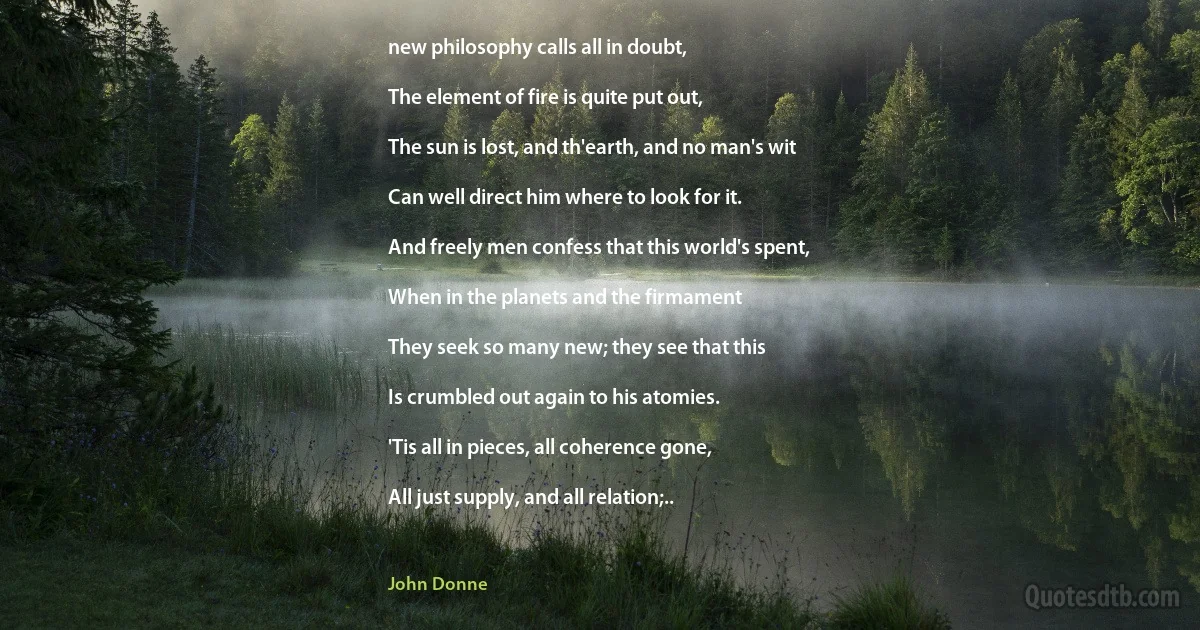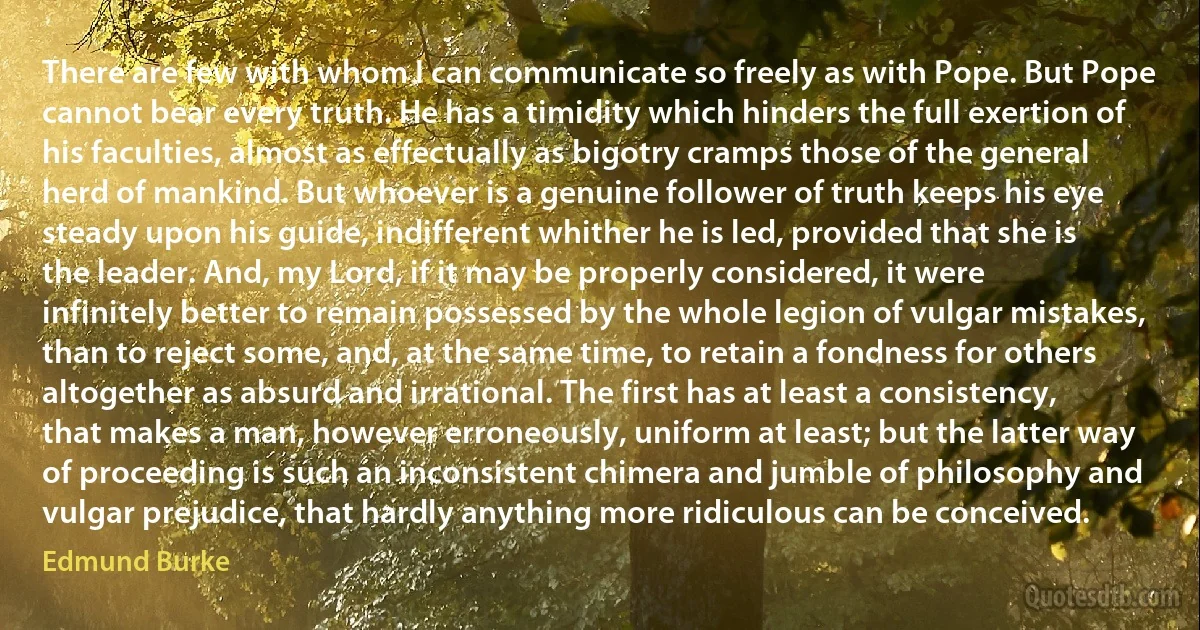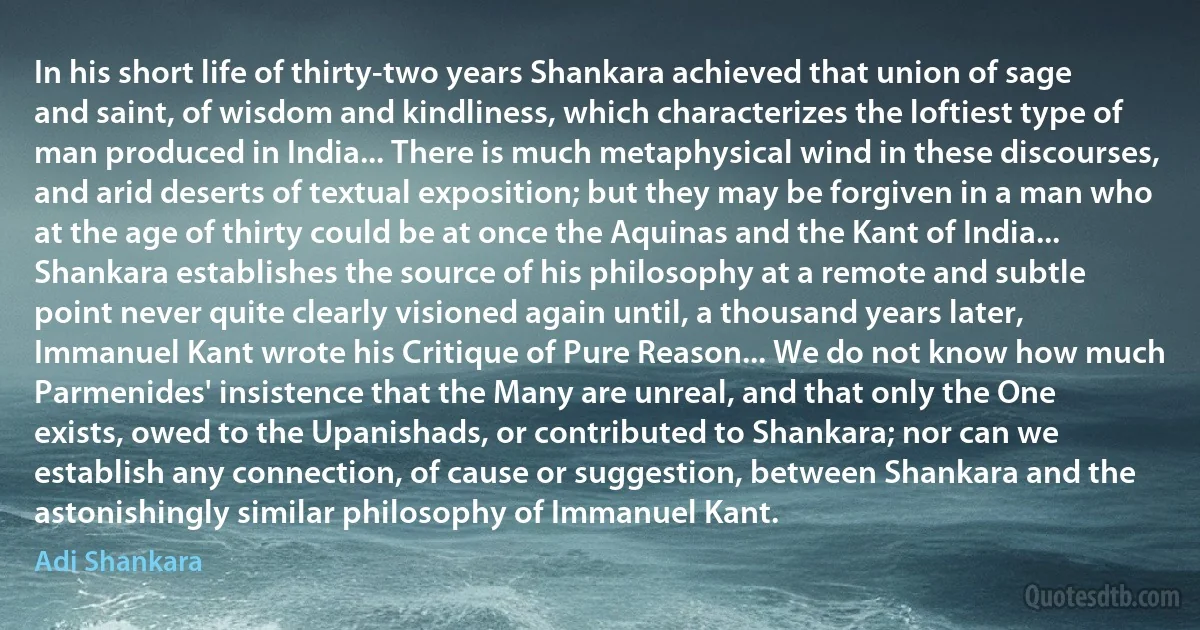Philosophy Quotes - page 98
The severe constraints imposed by determinism may appear to limit philosophy in a rather arbitrary way. However, there is no denying that in the natural sciences - and especially in biology - it is a very effective tool for avoiding the innate tendency to explain the universe as a whole in terms of general laws.

Santiago Ramón y Cajal
Now, my own suspicion is that the universe is not only queerer than we suppose, but queerer than we can suppose.....I suspect that there are more things in heaven and earth than are dreamed of, or can be dreamed of, in any philosophy. That is the reason why I have no philosophy myself, and must be my excuse for dreaming.

J. B. S. Haldane
The truths of the ṛṣis are not evolved as the result of logical reasoning or systematic philosophy but are the products of spiritual intuition, dṛṣti or vision. The ṛṣis are not so much the authors of the truths recorded in the Vedas as the seers who were able to discern the eternal truths by raising their life-spirit to the plane of universal spirit. They are the pioneer researchers in the realm of the spirit who saw more in the world than their followers. Their utterances are not based on transitory vision but on a continuous experience of resident life and power. When the Vedas are regarded as the highest authority, all that is meant is that the most exacting of all authorities is the authority of facts.

Sarvepalli Radhakrishnan
In Indian Philosophy he not only laid a stone foundation surely and truly but also built an edifice that shall outlast any philosophic storm. It was not so much a history as an exposition, and the exposition was vivid, vital and gripping. It was full of feeling. It made an epoch by itself. It was the two volumes of Indian Philosophy in the "Library of Philosophy" that showed that there was hardly any height of spiritual insight or rational philosophy attained in the world that has not its parallel in the vast stretch he dealt with that lies between the early sages and the modern Naiyaikas [leaders].

Sarvepalli Radhakrishnan
In 1904, he entered Madras Christian College was trained in European philosophy was introduced to the philosophies of Berkeley, Leibniz, Locke, Spinoza, Kant, J.S. Mill, Herbert Spencer, Fichte, Hegel, Aristotle, and Plato among others. He was also introduced to the philosophical methods and theological views of his MA supervisor and most influential non-Indian mentor, Professor A.G. Hogg.

Sarvepalli Radhakrishnan
Carnap made a detailed analysis of Heidegger's statement, "Nothing nihilates,” in order to show that it is purely verbal, devoid of empirical meaning. (Incidentally, this is the only sentence from existentialist philosophy the majority of contemporary positivists appear familiar with.)

Leszek Kołakowski
Castoriadis has given this tradition [the tradition of praxis philosophy] new life by introducing a unique linguistic turn. His work has a central place among the new departures in praxis philosophy that have evolved since the mid-1960s, especially in Eastern Europe (in Prague, Budapest, Zagreb, and Belgrade), and that for a decade enlivened the discussions at the Summer School of Korčula. It is the most original, ambitious, and reflective attempt to think through the liberating mediation of history, society, external and internal nature once again as praxis.

Cornelius Castoriadis
The theme which constantly recurs is the complex interaction between techniques, science, and philosophy. Science stands as a middle term between the established and transmitted practice of men who work for a living, and the pattern of ideas and traditions which assure the continuity of society and the rights and privileges of the classes that make it up.

John Desmond Bernal
Our instinct has outrun our theory in this matter; for while we still insist upon free will and sin, we make allowance for individuals who have gone wrong, on the very ground of provocation, of temptation, of bad education, of infirm character. By and by philosophy will follow, and so at last we may hope for a true theory of morals. It is curious to watch, in the history of religious beliefs, the gradual elimination of this monster of moral evil. The first state of mankind is the unreflecting state. The nature is undeveloped, looking neither before nor after; it acts on the impulse of the moment, and is troubled with no weary retrospect, nor with any notions of a remote future which present conduct can affect; and knowing neither good nor evil, better or worse, it does simply what it desires, and is happy in it. It is the state analogous to the early childhood of each of us, and is represented in the common theory of Paradise - the state of innocence.

James Anthony Froude
Wittgenstein's appeal lies in the fact that he provides a strange kind of vindication of romanticism, of conceptual Gemeinschaft, of custom-based concepts rather than statute-seeking Reform, and that he does so through a very general theory of meaning, rather than from the premisses habitually used for this purpose. Because there is no unique formal notation valid for all speech, each and every culture is vindicated. One never knew that could be done - and so quickly too! It is that above all which endows his philosophy with such a capacity to attract and to repel. His mystique of consensual custom denies that anything can sit in judgment of our concepts, that some may be more rational and others less so. So all of them are in order and have nothing to fear from philosophy, as indeed he insists. This is a fairly mild form of irrationalism, invoking no fierce dark Gods, merely a consensual community. It is the Soft Porn of Irrationalism.

Ernest Gellner
Cruyff introduced some passing drills into Barça's ‘arterial' system. And since then, the rondos have been not just a method but a symbol of the club's playing style: of dominating and never losing the ball. Cruyff blended several ideas and concepts and converted them into a philosophy – the seeds of which were planted throughout a club in urgent need of a footballing identity. Until then, the first team of Barcelona had been comfortably living in a world of excuses and enemies, content with their role as victims when faced with Real Madrid, an institution seen from Catalonia as the club of the Establishment.

Johan Cruyff
More than an athlete, Cruyff was also a great thinker, someone who reinvented the sport (...) Cruyff has left us now, but his vision and philosophy will hopefully live forever. You can see it in the way Barcelona-one of two clubs Cruyff revolutionized, along with Ajax-still plays every week. It's a style that has admirers around the world. I think a lot of people share that [philosophy] with him. You want to see this type of game, where you set the tone, you control the game, you make it fast, you make it attractive and attacking. He's always been famous for his version of the 4–3–3 with the wide wingers, all technically highly gifted and fast. This is his mark."

Johan Cruyff
Yuki Matsumoto: "Madonna inspires creativity and expressions beyond gender, religion, race, nationality, culture and all borders. "Madonna's philosophy and originality always invigorates the world audience every time she produces a new album. Conventions and trends are challenged and redefined for the new values. "Madonna is in sync with nature and balances her lifestyle to achieve her best physical and mental conditions. Her ever innovative spirits are in tune with her respect of nature. Despite her celebrity and never ending professional activities, Madonna always says FAMILY FIRST. Love and respect for all those who are dear to her are the most important values in life."

Madonna (entertainer)
When the religion from Rome was imposed on Northern and Western Europe, it was done by torture, murder, bribery and deceit. So, Adepts or Priests in the old, Aryan Mystery or Pagan religions simply infiltrated the Church. In particular during the Dark Ages as monks or lesser clergy they kept alive the art of reading and writing as well as science and philosophy. The Church began by killing scientists and philosophers, and burning libraries, thus engendering the Dark Ages of disease, superstition, slavery, inquisitions and misery.

David Lane (white nationalist)
Here again there is a parallel: informed Hindus are pained by the denial of their centuries of suffering at the hands of Islam, and are likewise pained by the denial of their millennia of civilization-building, a denial which goes by the name of Aryan Invasion Theory... for Indians, the AIT likewise implies the denial of a long stretch of Indian history. The AIT denies principally the history of the Solar and Lunar dynasties and other tribes living in Aryavarta (the area from Sindh to Bihar and from the Vindhyas to Kashmir), as covered in the Flu for a period from the dawn of proto-history to the 1st millennium BC. The major motifs (epics, artistic standards, schools of philosophy) of Indian civilization are embedded in that history, which is simply denied in its long pre-1500 BC phase, and vilified as merely the cultural superstructure of an ethnic subjugation of pre-Aryans by Aryans in its post-1500 BC phase.

Koenraad Elst
We are afraid of the known and afraid of the unknown. That is our daily life and in that there is no hope, and therefore every form of philosophy, every form of theological concept, is merely an escape from the actual reality of what is. All outward forms of change brought about by wars, revolutions, reformations, laws and ideologies have failed completely to change the basic nature of man and therefore of society.

Jiddu Krishnamurti
From modern capitalism, as from a poisoned fountainhead, there flows that stream of detestable internationalism, by which the Warburgs, the Rothschilds and the Morgans dominate affairs not only in America but also in the Central Banks of Europe... It is an internationalism which cares not for the righteousness of social justice or of sound philosophy, but is willing for the protection of its private property, to become a bed-fellow with the harlot of the ages.

Charles Coughlin
Philosophy finds religion, and modifies it; and conversely religion is among the data of experience which philosophy must weave into its own scheme. Religion is an ultimate craving to infuse into the insistent particularity of emotion that non-temporal generality which primarily belongs to conceptual thought alone. In the higher organisms the differences of tempo between the mere emotions and the conceptual experiences produce a life-tedium, unless this supreme fusion has been effected. The two sides of the organism require a reconciliation in which emotional experiences illustrate a conceptual justification, and conceptual experiences find an emotional illustration.

Alfred North Whitehead
In a book called Symbolism, Its Meaning and Effect, Whitehead points out that perception is usually a matter of symbols, just like language; I say I see a book when I actually see a red oblong. The Transactionists (who have been influenced by Whitehead rather than Husserl) take this one stage further, and point out that when I 'perceive' something, I am actually making a bet with myself that what I perceive is what I think it is. In order to act and live at all, I have to make these bets; I cannot afford to make absolutely certain that things are what I think they are. But this means that we should not take our perceptions at face value, any more than Nietzsche was willing to take philosophy at its face value; we must allow for prejudice and distortion.

Alfred North Whitehead
Miracles in mysticism don't occupy such an important place. It's metaphor, for the peasants, for the crowds, to impress people. What does mysticism really mean? It means the way to attain knowledge. It's close to philosophy, except in philosophy you go horizontally while in mysticism you go vertically. You plunge into it. Philosophy is a slow process of logic and logical discourse: A bringing B bringing C and so forth. In mysticism you can jump from A to Z. But the ultimate objective is the same. It's knowledge. It's truth.

Elie Wiesel
The origin of things, considered not as leading to anything, but in itself, contains the idea of First, the end of things that of Second, the process mediating between them that of Third. A philosophy which emphasises the idea of the One, is generally a dualistic philosophy in which the conception of Second receives exaggerated attention: for this One (though of course involving the idea of First) is always the other of a manifold which is not one. The idea of the Many, because variety is arbitrariness and arbitrariness is repudiation of any Secondness, has for its principal component the conception of First. In psychology Feeling is First, Sense of reaction Second, General conception Third, or mediation. In biology, the idea of arbitrary sporting is First, heredity is Second, the process whereby the accidental characters become fixed is Third. Chance is First, Law is Second, the tendency to take habits is Third. Mind is First, Matter is Second, Evolution is Third.

Charles Sanders Peirce



